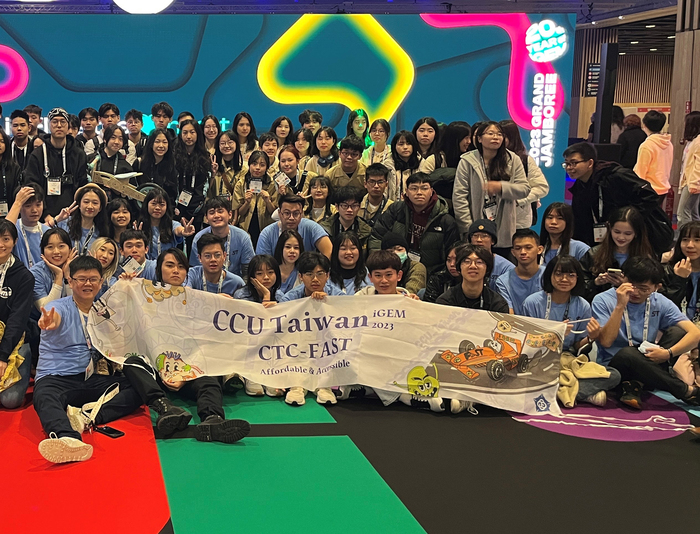The CCU iGEM Team won a Gold Medal for the development of the Lung Cancer Circulating Tumor Cell Detection Instrument at an international competition


According to the data from the Ministry of Health and Welfare, approximately 230-300 people out of
every 100,000 in Taiwan are diagnosed with cancer. Even after completing treatment, continuous
monitoring is necessary. A team of 25 students from various departments at National Chung Cheng
University (CCU) focused on post-cancer surgery follow-up. They developed a synthetic biologymanufactured CTC detection instrument, offering a more affordable and convenient option for lung
cancer patients. In early November, the team traveled to Paris, France, to participate in the
International Genetically Engineered Machine Competition (iGEM), where they won a gold medal
for their research topic.
According to the statistical results of the World Health Organization, global cancer cases have risen
to 19.3 million new cases. The estimated total number of people surviving within five years after
cancer diagnosis (5-year prevalence) is 50.6 million. Taiwan ranks first in disease mortality rates,
with approximately 86% concentrated in the population aged 55 and above. Cancer is an evolving
disease, and even after completing treatment, regular follow-up examinations are necessary to
monitor the progression of the disease. Through circulating tumor cell (CTC) blood testing, it is
possible to track whether cancer is recurring or if there is a risk of metastasis.
Cancer is unlike common illnesses; there is a possibility of recurrence even after completing
treatment. This is a lifelong challenge for cancer patients, leading to psychological concerns about
recurrence," said Wu, the iGEM team leader. The high mortality rate of cancer is attributed to
metastasis, and current technologies for tracking cancer recurrence vary but may have some
limitations. For instance, cancer patients may need to coordinate appointments with large hospitals,
leading to delays. Therefore, the team decided to research and develop a synthetic biologymanufactured CTC detection instrument to provide a more convenient option for patients
Wu mentioned that the CTC detection instruments commonly used in general medical practice rely
on antibody testing. Antibodies require low-temperature storage, and the testing cost is relatively
high. The instrument developed by the CCU team utilizes DNA nanostructures, allowing it to be
stored at room temperature. Moreover, the cost is significantly lower compared to antibody-based
methods. Wu also noted that due to the need for further development and adjustments in synthetic
biology experiments and hardware development, it would take an additional two to three years before
the technology can be implemented more extensively in healthcare settings with lower medical
capacity.
The CCU iGEM team has entered its 7th edition, composed of 25 students from four
interdisciplinary colleges: Science, Engineering, Social Sciences, and Management. In the future, the
CCU team plans to collaborate with cancer centers, foundations, and other institutions to establish a
comprehensive network. They aim to further integrate their services with cancer patient care, gather
and provide data for cancer research, and contribute to the overall improvement of cancer-related
initiatives.

